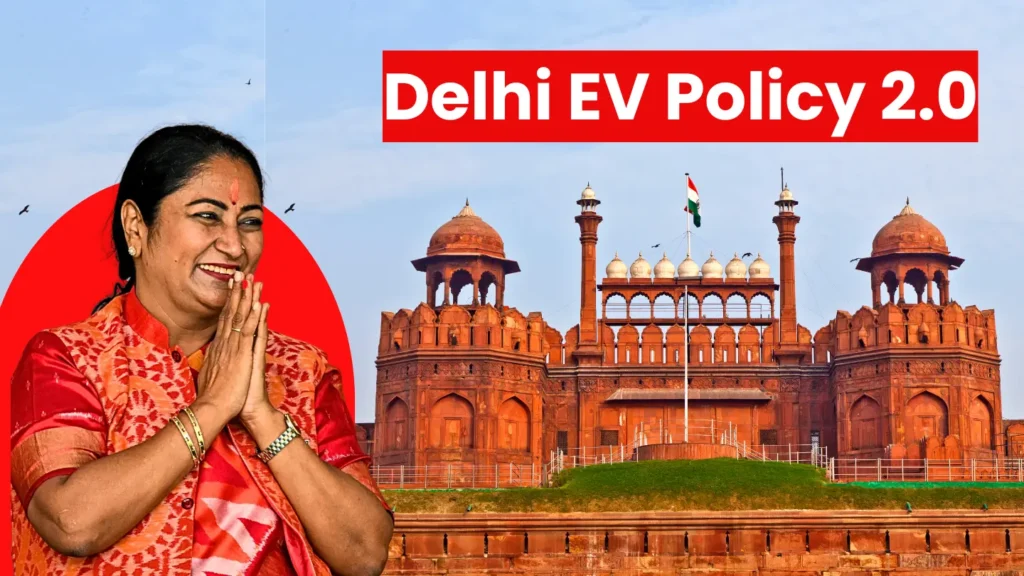
Delhi, the capital city of India, is poised to revolutionize its transportation sector with the proposed Electric Vehicle (EV) Policy 2.0, announced in early March 2025.
This policy aims to accelerate the transition to electric mobility, targeting 95% of new vehicle registrations to be electric by 2027, up from the previous 25% target by 2024 under the original policy.
The policy’s ambitious goals include mandating the third private car in households to be electric, alongside stringent bans on fossil fuel vehicles and extensive infrastructure development.
This note provides a comprehensive overview of the policy, its key components, and potential impacts, based on recent reports from reputable sources.
The original Delhi EV Policy, introduced in 2020, was lauded as one of India’s most progressive, aiming for 25% EV adoption by 2024.
However, with only 13-14% achieved by that deadline, the government has proposed EV Policy 2.0 to address the shortfall and combat severe air pollution, which is significantly contributed by vehicular emissions, especially from two- and three-wheelers.
The new policy, expected to take effect in April 2025, outlines a roadmap to strengthen Delhi’s position as a leader in EV adoption in India, with objectives including improving air quality, creating livelihood opportunities in the EV ecosystem, enhancing energy security, and ensuring an equitable transition.
The policy sets forth several ambitious targets and mandates, detailed as follows:
A notable provision is the mandate that the third private car purchased in any household must be an electric vehicle.
This rule, reported by Hindustan Times 3rd private car must be EV: Delhi govt proposal aims to encourage multi-car households to adopt EVs, potentially increasing overall EV penetration.
Additionally, no CNG auto permits will be renewed from this date, with only e-auto permits issued, as per reports from Swarajya Mag (Delhi’s EV Policy 2.0: Third Private Car To Be Electric; No Fossil Fuel Three-Wheeler Registrations From August, Two-Wheelers From 2026).
The policy focuses on systematically phasing out CNG-powered auto-rickshaws, taxis, and light commercial vehicles (LCVs), replacing them with electric alternatives.
This is highlighted in articles from The Times of India (Delhi’s EV policy 2.0 to phase out CNG autos, target 95% EVs by 2027: Details) and Delhi Government Unveils Proposed EV Policy, Targets 95% EV Adoption By 2027.
To facilitate this transition, the policy includes several incentives and support mechanisms:
A critical component of EV Policy 2.0 is the expansion of charging infrastructure to support the anticipated surge in EV usage:
To fund these initiatives, a dedicated State EV Fund will be established, financed through green levies, pollution cess, and aggregator license fees.
This fund will play a critical role in providing the necessary incentives and ensuring the transition is efficient and sustainable, as reported by DriveSpark News.
The implementation of Delhi EV Policy 2.0 is expected to significantly improve air quality by reducing vehicular emissions, particularly from two- and three-wheelers, which contribute 42% of PM 2.5 pollution, as noted in the Switch Delhi policy update (Switch Delhi – Policy update). It also aims to create livelihood opportunities in the EV ecosystem, enhance energy security, and ensure grid resilience.
However, challenges include:
Experts, as mentioned in the Hindustan Times, note that the ban on ICE two-wheeler registrations beyond August 15, 2026, could set a precedent, though the absence of a similar plan for ICE cars might limit its scope.
The original Delhi EV Policy, introduced in 2020, aiming for 25% EV adoption by 2024, with provisions for fiscal and non-fiscal incentives like road-tax waivers and green registration plates, as seen in Switch Delhi’s mission statement (Switch Delhi – The mission).
EV Policy 2.0 significantly escalates this, with a 95% target by 2027 and introduces more stringent measures like the third private car rule and vehicle bans, not present in the earlier policy.
It also places a stronger emphasis on phasing out CNG vehicles and expanding charging infrastructure, reflecting lessons learned from the previous policy’s underachievement.
Delhi EV Policy 2.0 represents a bold and comprehensive approach to transforming the city’s transportation sector towards sustainability. By setting ambitious targets, providing necessary incentives, and planning extensive infrastructure, the policy aims to make Delhi a global leader in EV adoption.
As of March 16, 2025, the policy is in the proposal stage, with final clearance pending cabinet approval, and its success will depend on effective implementation and addressing the outlined challenges.
This policy not only promises environmental benefits but also economic growth through the EV ecosystem, potentially setting a benchmark for other cities in India and beyond.
Ather Energy has unveiled the EL01 concept scooter and its all-new EL platform, marking a major step towards affordable and…
The electric vehicle journey is no longer about promises—it’s about real-world performance. Among the latest models making waves, the BYD…
This article is the latest update as of 30 Aug 2025 TVS Motor Company has introduced its latest electric scooter,…
TVS Motor Company has officially launched its latest electric scooter, the TVS Orbiter, expanding its EV portfolio in the growing…
This article is the latest updated as of August 28, 2025 Suzuki Motor Corporation has announced a massive investment of…
This article is the latest updated as of August 28, 2025 Euler Motors, one of India’s leading electric commercial vehicle…
This website uses cookies.